仁爱英语九年级上册Unit 2 Topic 1 Section B
2020 仁爱英语九年级上册Unit1-Unit2课文翻译

Unit 1 The changing world变化中的世界Topic 1 Our country has developed rapidly我国发展迅速Section A1a:(After a long holiday, Kangkang is happy to see his friends.)(长假过后,康康很高兴会见到他的朋友们。
)Hi, Jane! Did you have a good summer holiday?你好,简,你暑假过得愉快吗?Yes. What about you?是的,你呢?Not bad. Rita, you have just come back from your hometown. How was your trip?不错。
丽塔,你刚从家乡回来,你的旅行怎么样?Great! I went to many places near my home in India. Great changes have taken place there and my hometown has become more and more beautiful. Where have you been, Jane? 好极了!在印度,我去了我家附近的很多地方。
那里发生了很大的变化,而且我的家乡变得越来越美丽了。
简,你去哪里了?I have been to Mount Huang with my parents. It's a beautiful place. But there were so many people that I couldn't find a good place to take photos. And where have you been, Kangkang ? 我和我的父母去过黄山,那是一个美丽的地方。
但是那里人太多了,我都找不到一个好的地方拍照。
Unit2+Topic+1+课文详解课件2023-2024学年仁爱版九年级英语上册

A. too many
B. too much
C. much too
D. too
( B ) 2. — Don’t smoke. It’s ________ to our health.
— Sorry, I won’t do it again.
A. harm
B. harmful
C. harms
D. harmed
( C ) 3. He has a headache. He feels difficult ________.
A. breathe
B. breath
C. to breathe
D. to breath
单项选择
( C ) 4. She is so noisy that I can’t ________ her.
bees and butterflies dancing.
butterfly n.蝴蝶 see sb. doing sth.看见某人正在做某事 see sb. do sth.看见某人经常在做某事
• Kangkang: Everything has changed.
一切都变了。
• Michael: Do you want to have a picnic here?
Unit2 Topic 1
点击此处输入副标题
Section A
Section A
正在计划
• (Kangkang, Jane, Maria and Michael are planning a picnic for Sunday.)
• Jane and Maria: Kangkang, where shall we go? 野餐
我总是心情很差。
九年级英语上册《Unit 2 Saving the Earth》Topic1 SectionB 教案 仁爱版
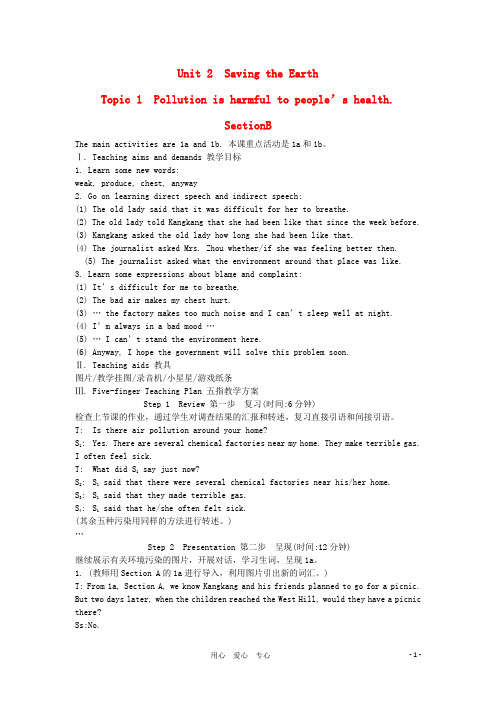
Unit 2 Saving the EarthTopic 1 Pollution is harmful to people’s health.SectionBThe main activities are 1a and 1b. 本课重点活动是1a和1b。
Ⅰ. Teaching aims and demands 教学目标1. Learn some new words:weak, produce, chest, anyway2. Go on learning direct speech and indirect speech:(1) The old lady said that it was difficult for her to breathe.(2) The old lady told Kangkang that she had been like that since the week before.(3) Kangkang asked the old lady how long she had been like that.(4) The journalist asked Mrs. Zhou whether/if she was feeling better then.(5) The journalist asked what the environment around that place was like.3. Learn some expressions about blame and complaint:(1) It’s difficult for me to breathe.(2) The bad air makes my chest hurt.(3) … the factory makes too much noise and I can’t sleep well at night.(4) I’m always in a bad mood …(5) … I can’t stand the environment here.(6) Anyway, I hope the government will solve this problem soon.Ⅱ. Teaching aids 教具图片/教学挂图/录音机/小星星/游戏纸条Ⅲ. Five-finger Teaching Plan 五指教学方案Step 1 Review 第一步复习(时间:6分钟)检查上节课的作业,通过学生对调查结果的汇报和转述,复习直接引语和间接引语。
仁爱版九年级英语上册Unit2Topic1SectionB教案

仁爱版九年级英语上册Unit2Topic1SectionB教案Unit 2 Saving the EarthTopic 1 Section B教案教学目标1.知识与能力目标Words and phrases: pain, produce, awful, bear, harmful, chest, editor, breathe/breath, soil get a pain in…, what’s worse, too much noise, too many problems, breathing problem, be harmful to, make a mess of, throw…aroundSentences: It’s difficult for me to breathe./ I’ve got a pain in my throat./ It’s really awful.A: How long have you been like this? A: Have you seen a doctor?B: I’ve been like this since la st week. B: Not yet.Grammar: Present Perfect (past participle和疑问句的问答).2.过程与方法通过谈论环境问题,让学生了解不同种类的污染及其危害。
3.情感态度与价值观引导学生关注环境问题,树立绿色环保意识,增强忧患意识和社会责任感。
教学重点1. some new words and useful phrases; the present perfect tense2. the present perfect tense教学过程Step 1 Review1. go over the phrases in section A2. Guide the Ss to discuss different kinds of pollution ingroups and share the answer together. Step 2 Presentation1. Watch the flash, then answer the questions below.1) Does Bruce look well?2) What’s wrong with him?3) How long has he been like this?4) Has he seen a doctor?2. Show a picture of the polluted West Hill, let the Ss listen to 1a once and tick the questions they hear in part A of 1b. Then check the answers together.A. Listen to 1a and check the questions you hear.1) What’s wrong with you?2) How long have you been like this?3) Where have you been?4) Have you seen a doctor?5) Have you noticed the dead fish in the river?B. Listen again and match each question above with an answer below.3. Read 1a and answer the questions.1) What caused Mrs. Zhou’s problems?2) What will Kangkang do?Step 3 Consolidation1.分角色朗读2a,选择四组进行比赛,激发学生朗读兴趣。
仁爱版九年级英语上册Unit 1 Topic 2 Section B教案

Unit 1 The Changing WorldTopic 2 Section B教案Teaching aims and demands1. Learn the new word: increase2. Master these sentences:(1) What’s the population of China?(2) It is increasing by 80 million every year.(3) Which country has the largest population?(4) So it is.(5) The problem is more serious in developing countries.(6) China has already carried out the one-child policy to control the population.3. Learn how to read the numbers: million, billion.Teaching aids录音机/多媒体课件/小黑板/世界人口示意图Teaching PlanStep 1 Review1.检查上节课教师布置的探究性活动,组织学生互评,教师选出较好的几份点评。
T: Many students wrote very well. You can talk about a lot of social problems.(由学生谈论的人口问题,引入本课话题——人口数量。
)T: Some students have talked about the population problem. As we know, it is hard to improve our living conditions, because we have a large population. Now, what’s the population of our country? (由学生举手回答。
初中英语仁爱版九年级上册Unit2Topic1知识点

初中英语仁爱版九年级上册Unit2Topic1知识点Unit2 Topic1Section A1.gone(不及物动词)不复存在,不见了,丢失,失窃2.XXX有某人或某物正在做某事Eg:There are some boys running on the playground.有一些男孩正在操场上跑步。
XXX.有某人/某物做某事Eg:There is no time to think.没有时间去想了。
3.pour...into...把...倒入...4.waste(形容词)废弃的,丢弃的,无用的(名词)废弃物,废料(动词)浪费waste of time浪费时间waste of money浪费金钱Section B1.It’s difficult for sb. to do sth.做某事对某人来说很困难2.howlong多久,多长时间,用来询问或谈论某段时间,答语通常用for,since等引导的时间状语,谓语动词必须为延续性动词。
—How long have you learned English?—I have learned English for three years.3.in a bad mood不爽,心情不好。
4.bear(动词)忍受,蒙受(名词)熊,鲁莽的人XXX 忍受...,对...有耐烦Eg:Please bear with me while I ask some questions.当我发问你时,请耐烦些。
作动词时常能够stand交换,stand蒙受,禁受;忍受,容忍,常与can,could 1连用。
stand+名词/代词/doing:忍受某人/某事/做某事I can’t stand working in an offic e.我几乎受不了在办公室工作。
5.anyway不管如何,使用时常常位于句子开头迁移转变处。
6.write to写信给...Section C1.be harmful to =do harm to =be bad for对...有害harm sb./sth.伤害某人/某物Reading in the sun is XXX在太阳底下读书对眼睛有害。
Unit1 Topic2 SectionB 教案 仁爱版九年级英语上册

九年级上册Unit 1 Topic 2 The population in developing countries is growing faster.Section B【教学构思】一、教材分析:本课属于课标话题人与社会——“世界与环境(The world and the environment)”中人口(Population)项目,涉及课标功能意念表“比较(Comparison)”中差别比较(Comparative and superlative)项目,主要谈论世界人口数量,了解发达国家与发展中国家人口分布及增长速度,以及所采取的控制人口增长的政策。
主要教学活动为1a,2和3,通过Kangkang和Maria的对话呈现主要教学内容,进一步学习与never,ever,already,just,yet等词连用的现在完成时以及表示比较的表达方式,训练学生“听”和“说”的语言能力。
通过2听音模仿,学习较大数词的读法,发现和总结较大数词的朗读规律。
通过小组讨论世界人口相关问题,回答3的问题,并积极思考和讨论控制人口的措施。
二、设计说明:根据学情和本课的语法及话题,本节课的教学设计将听与说相结合,以1a为载体,立足话题,聚焦语法,通过听说练习内化知识;在语言生成阶段,循序渐进,帮助学生学以致用,并通过同伴合作完成学习任务。
本课在重、难点突破的方法上有所创新,教师通过听说活动在“学中用”,接着通过小组活动“用中学”,激发学生学习兴趣,引导积极参与课堂,发表观点和看法,发展学生思维品质和团队协作意识。
【教学目标】1. 通过听力活动和朗读对话,掌握对话大意和细节,培养“听”与“读”的语言能力;2. 在对话中学习比较的表达方式,在讨论活动中实践运用,培养“说”的语言能力;3. 通过听音模仿,发现和总结较大数词的朗读规律,培养总结概括的思维品质;4. 在小组活动中实践运用所学语言知识,在讨论、思辨、梳理、概括等思维活动中,发展思维品质。
仁爱版 九年级上册Unit2 Topic1 Section B 教学设计
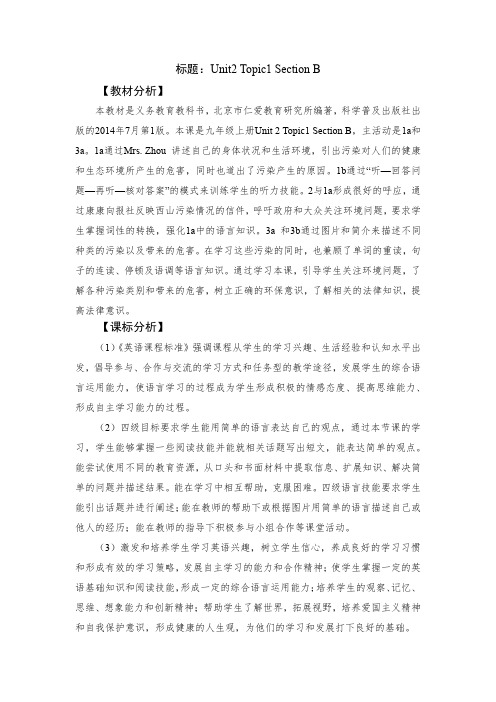
标题:Unit2 Topic1 Section B【教材分析】本教材是义务教育教科书,北京市仁爱教育研究所编著,科学普及出版社出版的2014年7月第1版。
本课是九年级上册Unit 2 Topic1 Section B,主活动是1a和3a。
1a通过Mrs. Zhou 讲述自己的身体状况和生活环境,引出污染对人们的健康和生态环境所产生的危害,同时也道出了污染产生的原因。
1b通过“听—回答问题—再听—核对答案”的模式来训练学生的听力技能。
2与1a形成很好的呼应,通过康康向报社反映西山污染情况的信件,呼吁政府和大众关注环境问题,要求学生掌握词性的转换,强化1a中的语言知识。
3a 和3b通过图片和简介来描述不同种类的污染以及带来的危害。
在学习这些污染的同时,也兼顾了单词的重读,句子的连读、停顿及语调等语言知识。
通过学习本课,引导学生关注环境问题,了解各种污染类别和带来的危害,树立正确的环保意识,了解相关的法律知识,提高法律意识。
【课标分析】(1)《英语课程标准》强调课程从学生的学习兴趣、生活经验和认知水平出发,倡导参与、合作与交流的学习方式和任务型的教学途径,发展学生的综合语言运用能力,使语言学习的过程成为学生形成积极的情感态度、提高思维能力、形成自主学习能力的过程。
(2)四级目标要求学生能用简单的语言表达自己的观点,通过本节课的学习,学生能够掌握一些阅读技能并能就相关话题写出短文,能表达简单的观点。
能尝试使用不同的教育资源,从口头和书面材料中提取信息、扩展知识、解决简单的问题并描述结果。
能在学习中相互帮助,克服困难。
四级语言技能要求学生能引出话题并进行阐述;能在教师的帮助下或根据图片用简单的语言描述自己或他人的经历;能在教师的指导下积极参与小组合作等课堂活动。
(3)激发和培养学生学习英语兴趣,树立学生信心,养成良好的学习习惯和形成有效的学习策略,发展自主学习的能力和合作精神;使学生掌握一定的英语基础知识和阅读技能,形成一定的综合语言运用能力;培养学生的观察、记忆、思维、想象能力和创新精神;帮助学生了解世界,拓展视野,培养爱国主义精神和自我保护意识,形成健康的人生观,为他们的学习和发展打下良好的基础。
仁爱英语九年级(上册)课文互译Unit1_2
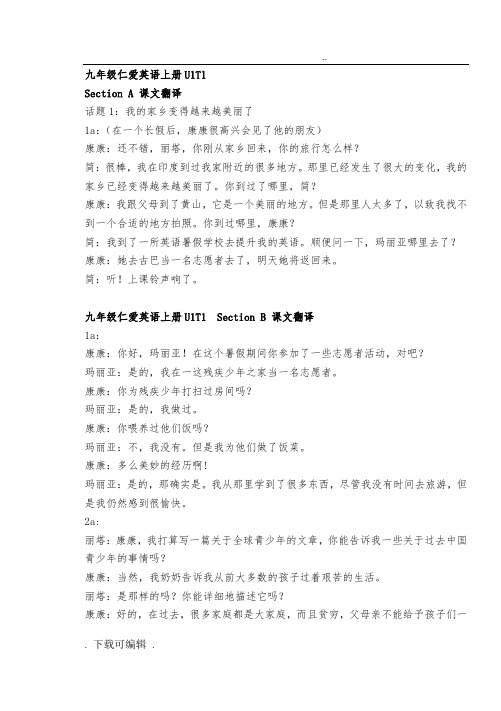
九年级仁爱英语上册U1T1Section A 课文翻译话题1:我的家乡变得越来越美丽了1a:(在一个长假后,康康很高兴会见了他的朋友)康康:还不错,丽塔,你刚从家乡回来,你的旅行怎么样?简:很棒,我在印度到过我家附近的很多地方。
那里已经发生了很大的变化,我的家乡已经变得越来越美丽了。
你到过了哪里,简?康康:我跟父母到了黄山,它是一个美丽的地方。
但是那里人太多了,以致我找不到一个合适的地方拍照。
你到过哪里,康康?简:我到了一所英语暑假学校去提升我的英语。
顺便问一下,玛丽亚哪里去了?康康:她去古巴当一名志愿者去了,明天她将返回来。
简:听!上课铃声响了。
九年级仁爱英语上册U1T1 Section B 课文翻译1a:康康:你好,玛丽亚!在这个暑假期间你参加了一些志愿者活动,对吧?玛丽亚:是的,我在一这残疾少年之家当一名志愿者。
康康:你为残疾少年打扫过房间吗?玛丽亚:是的,我做过。
康康:你喂养过他们饭吗?玛丽亚:不,我没有。
但是我为他们做了饭菜。
康康:多么美妙的经历啊!玛丽亚:是的,那确实是。
我从那里学到了很多东西,尽管我没有时间去旅游,但是我仍然感到很愉快。
2a:丽塔:康康,我打算写一篇关于全球青少年的文章,你能告诉我一些关于过去中国青少年的事情吗?康康:当然,我奶奶告诉我从前大多数的孩子过着艰苦的生活。
丽塔:是那样的吗?你能详细地描述它吗?康康:好的,在过去,很多家庭都是大家庭,而且贫穷,父母亲不能给予孩子们一. 下载可编辑.个教育。
丽塔:哦,那么大多数孩子们是怎样度过他们的童年的?康康:为了帮助供养他们的家庭,他们不得不去当童工,他们整天整夜地工作,从来没有饱食过。
丽塔:如今青少年怎么样呢?康康:现在我们的国家迅速地发展了,政府给贫困家庭以支持,所以孩子们能够得到良好的教育。
丽塔:哦,他们是幸运的。
九年级仁爱英语上册U1T1 Section C课文翻译1a :我的关于北京的报告大家好!我是康康。
我的奶奶生活在北京40多年了,她亲自见证了北京的变化。
仁爱版英语九年级上册说课稿Unit2Topic1

仁爱版英语九年级上册Unit2 Topic1 Pollution causes too many problems. Section D说课稿尊敬的各位老师:大家下午好!今天我说课的题目是九年级英语Unit 2 Topic1 Pollution causes too many problems. Section D。
本次说课我将从四个方面向大家进行介绍,他们分别是:教材分析、教法分析、学法指导以及教学程序,首先让我们来看一下本次说课的第一部分,即教材分析部分。
在教材分析中,我将对教材从1、教材地位和作用,2、教学目标,3、教学重点、难点三个方面进行分析。
一.教材分析1、教材的地位和作用本课是仁爱版九年级第二单元第一话题Section D的内容。
本课是本话题的重要组成部分,以口语、听力练习、复习、总结为主,通过谈论污染这一话题,复习直接引语和间接引语,让学生学会把直接引语变为间接引语的方法,总结污染的种类及其危害,教育学生环保从身边做起,提高环保意识。
本部分是前后知识的载体,本话题的表达在初中英语教学中占有重要地位。
2、教学目标根据初中英语新课程标准的要求,结合课本教材,确定本节课的教学目标如下:即知识目标、能力目标和情感目标。
(1).在知识目标中,让学生掌握直接引语和间接引语的相互变化的方法,听懂短文内容,掌握一些新单词和短语,完成自主学习任务,这是本节课所要达到的知识目标。
(2).在能力目标方面,着重让学生理解有关污染的短文,能进行直接引语和间接引语的转变,并激发学生对英语学习的兴趣,这是本节课所要达到的能力目标。
(3). 情感目标:在培养学生组织和运用语言能力的基础上,让学生了解地球污染的一些情况,进一步引导学生懂得环境保护的重要性,增强环保意识,为保护环境做力所能及的事情。
3、教学重点和难点本节课的重点、难点部分,在本节课当中掌握直接引语和间接引语的相互变化的方法,短文理解,掌握新词是本节课的重点。
仁爱版九年级英语上册Unit2 Topic 1课件(共75张PPT)

(go). 3. Everything __h_a_s_c_h_a_n_g_e_d__ (change) in the past few years. 4. Pandas don’t have enough bamboos __t_o_e_a_t__ (eat) now
B.too much
C.many too
D.too many
Unit 2 Saving the Earth
Topic 1 Pollution has caused too many problems .
Section B
• 1 breathe v.意为“呼吸”,名词是breath,注 意不同词性时单词的拼写。
gone. A: What has happened here? B: The villagers have destroyed them.
hill/ trees farmers/cut down
lake/fish factory/ pollute
B. Listen again and complete the sentences.
Two years ago
Now
1. It was a __b_e_a_u_t_if_u_l_p_la_c_e__. 1.T_h_e__fl_o_w_e_r_s__a_n_d_g_r_a_s_s_
2. There were
have gone.
__lo_t_s__o_f _fl_o_w_e_r_s__a_n_d_g_r_a_s_s_. 2. The water is _s_o__d_i_rt_y_and
仁爱英语九年级 Unit2 Topic1 翻译
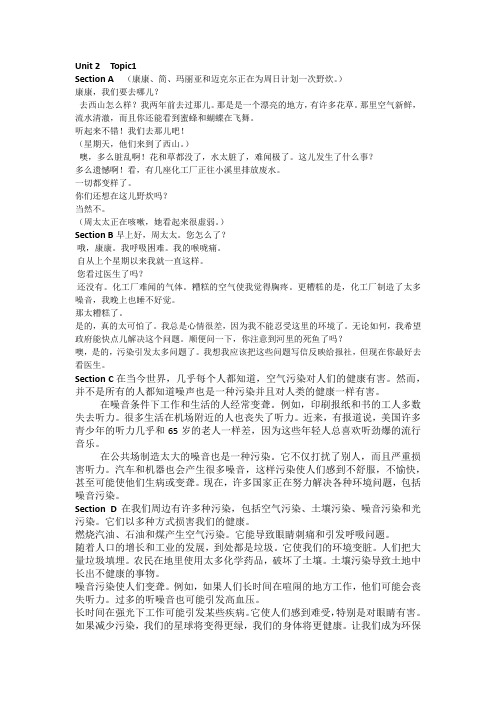
Unit 2 Topic1Section A (康康、简、玛丽亚和迈克尔正在为周日计划一次野炊。
)康康,我们要去哪儿?去西山怎么样?我两年前去过那儿。
那是是一个漂亮的地方,有许多花草。
那里空气新鲜,流水清澈,而且你还能看到蜜蜂和蝴蝶在飞舞。
听起来不错!我们去那儿吧!(星期天,他们来到了西山。
)噢,多么脏乱啊!花和草都没了,水太脏了,难闻极了。
这儿发生了什么事?多么遗憾啊!看,有几座化工厂正往小溪里排放废水。
一切都变样了。
你们还想在这儿野炊吗?当然不。
(周太太正在咳嗽,她看起来很虚弱。
)Section B早上好,周太太。
您怎么了?哦,康康。
我呼吸困难。
我的喉咙痛。
自从上个星期以来我就一直这样。
您看过医生了吗?还没有。
化工厂难闻的气体。
糟糕的空气使我觉得胸疼。
更糟糕的是,化工厂制造了太多噪音,我晚上也睡不好觉。
那太糟糕了。
是的,真的太可怕了。
我总是心情很差,因为我不能忍受这里的环境了。
无论如何,我希望政府能快点儿解决这个问题。
顺便问一下,你注意到河里的死鱼了吗?噢,是的,污染引发太多问题了。
我想我应该把这些问题写信反映给报社,但现在你最好去看医生。
Section C在当今世界,几乎每个人都知道,空气污染对人们的健康有害。
然而,并不是所有的人都知道噪声也是一种污染并且对人类的健康一样有害。
在噪音条件下工作和生活的人经常变聋。
例如,印刷报纸和书的工人多数失去听力。
很多生活在机场附近的人也丧失了听力。
近来,有报道说,美国许多青少年的听力几乎和65岁的老人一样差,因为这些年轻人总喜欢听劲爆的流行音乐。
在公共场制造太大的噪音也是一种污染。
它不仅打扰了别人,而且严重损害听力。
汽车和机器也会产生很多噪音,这样污染使人们感到不舒服,不愉快,甚至可能使他们生病或变聋。
现在,许多国家正在努力解决各种环境问题,包括噪音污染。
Section D在我们周边有许多种污染,包括空气污染、土壤污染、噪音污染和光污染。
它们以多种方式损害我们的健康。
仁爱英语九年级上册Unit2 短语句子

仁爱英语九年上册Unit2 Topic1 重点短语和句子Unit2 Topic1 Section A1看到某人正在做某事see sb. doing sth.2听起来很好sound great3真脏!What a mess!4真可耻!What a shame!5把...倒入pour ...into6当然不of course not7砍到cut down8You can see bees and butterflies dancing.你可以看到蜜蜂和蝴蝶在跳舞。
9有几家化工厂把废水排到小溪。
There were several chemical factories pouring waste water into the stream. 10Everything has changed一切都变了12 it was too dirty for me to live in.但是它对我来说太脏了无法居住Unit2 Topic1 Section B1.have a pain in the throat喉咙痛2.produce terrible gas产生难闻气体3.make my chest hurt使我胸痛4.make people sick使人们生病5.what was worse更糟的是6.make too much noise制造太多噪音7.in a bad mood心情不好8.solve the problem解决问题9.by the way顺便问一下10.cause too many problems引起太多问题11.cause breathing problems引起呼吸问题12.make great efforts to do sth.尽力做某物13.nosie/air/light pollution噪音/空气/光污染14.be harmful to对。
有害15.make a mess of使。
仁爱英语多媒体教学初中九年级上册课件 Unit 1 Topic 2 Section B

A: Is she..? B: Yes, she is./
No, she isn’t. She is… A: Is she from…? B: Yes, she is.
No, she isn’t. She is from…
Work in pairs
▪Name: Beckham
Who is he?
Is she/he from…? Is she/he…?
Who is he?
Is she/he from…? Is she/he…?
In China, the family name often goes first, but in America, England, Canada, etc, it always goes last.
— Is she from Canada? — _____Y_e_s,_s_h. e is
是的,她是。
— Is he Li Ming?
— __N_o,_he_isn_’t_. H_e i_s Y_uk_io______.
事实是肯定的 就用yes 回答, 事实是否定的 就用no回答。
不,他不是。他是Yukio。
Yes, he is.
Is he from China?
Yes, he is.
Is he Kangkang?
No, he isn’t.
He is from America.
Is he from China?
No, he isn’t. He is Michael.
Work in pairs
▪ Name: Xie Na
Deng Yaping
Zhao Lin
Tom Cruise
仁爱版英语九年级上册unit2教案

仁爱版英语九年级上册unit2教案教案要面向全体学生,关注每个学生的情感,激发他们学习英语的兴趣,帮助他们建立学习的成就感和自信心,使他们在学习过程中发展综合语言运用能力,下面是我给大家整理的仁爱版英语九年级上册unit2教案5篇,希望对大家能有所帮助!仁爱版英语九年级上册unit2教案1Unit1TheDevelopingWorldTopic1ChinahasdevelopedrapidlyInrecentyears.SectionAThemainactivityis1a.本课重点活动是1a。
Ⅰ.Teachingaimsanddemands教学目标1.Learnsomenewwordsandaphrase:proper,bytheway,bell,grandpa,chairwoman,grandson2.Learnausefulsentence:Theregoesthebell.3.Learnthepresentperfecttense:(1)Rita,youhavejustcomebackfromyourhometown.(2)—Wherehaveyoubeen,Jane?—IhavebeentoMountHuangwithmyparents.(3)—Bytheway,where’sMaria?—ShehasgonetoCubatobeavolunteer…4.Taltthechildren’svacationexperiences.Ⅰ.Teachingaids教具录音机/小黑板/学生的旅游纪念照/图片/幻灯片Ⅰ.Five-fingerTeachingPlanStep1Review通过教师询问学生的暑期活动,导入话题,呈现部分生词。
T:Listen!Thebellisringing.Let’sbeginourclass!(教师解释Thebellisringing等于Theregoesthebell,板书bell,要求学生掌握。
仁爱版九年级英语上册Unit1_Topic2_SectionB_优质课课件(共20张PPT)
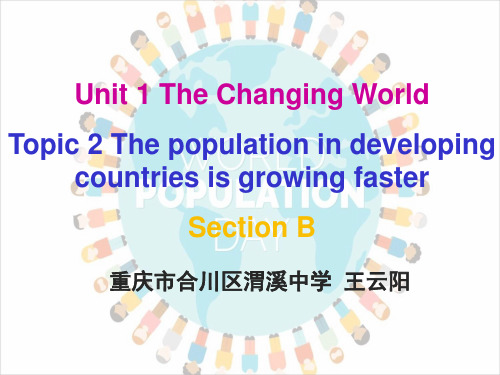
1. the world 2. China
3. India
4. the USA
A. 309 million B. 6.8 billion C. 1.3 billion D. 1.1 billion
Make similar conversations after the example.
Example: A.: What’s the population of the world? B: It’s about 6.8 billion.
= The world has a population of 6.8 billion.
80 80 80
6800
The population is increasing by 80 million every year.
What a large population!
1b Listen to 1a and match the information.
1a Listen,look and say.
提示:点击图片即可观看动画
So it is. 确实如此。
SSooSsoshheiet dihsoa.ess..
SThhLeeuchsyauspdeacrnlmecaenrsekdet is vtvehereryyrcowroeomlwl.ded.
So +主语+ be/情态动词/助动词
population
表示整体人口(作单数)
e.g. The population of this city is nearly 300 000. 这个城市的人口将近三十万。
BACK
表示部分人口(作复数)
e.g. 80% of the population in Chinaare farmers. 中国百分之八十的人口是农民。
- 1、下载文档前请自行甄别文档内容的完整性,平台不提供额外的编辑、内容补充、找答案等附加服务。
- 2、"仅部分预览"的文档,不可在线预览部分如存在完整性等问题,可反馈申请退款(可完整预览的文档不适用该条件!)。
- 3、如文档侵犯您的权益,请联系客服反馈,我们会尽快为您处理(人工客服工作时间:9:00-18:30)。
Topic 1 Pollution has caused too many problems . Section B
1.看见蜜蜂和蝴蝶 1. see bees and butterflies 正在跳舞 dancing 2.花草都消失了。 2. The flowers and grass 3. 这里发生了什么 have gone. 事情? 3. What has happened here ? 4. 把……倒入…… 4. pour … into … 5. 有某人/某物正 5.There be sb./sth. doing sth. . 在做某事。 6 砍倒 6. cut(+代词) down(cut-cut-cut)
√ 5. √
4.
d Have you noticed the dead fish in the river? _____
B. Listen again and match each question above with an answer below. a. Not yet. b. I’ve been like this since last week. C. It’s difficult for me to breathe. d. Oh, yes.
be harmful to = do harm to 对……有害
e.g. It is harmful to animals. = It does harm to animals. harm v. & n. 危害,伤害,损害 harmful adj. 有害的
1a Look, listen and say.
No, he hasn’t. / Not yet.
Kangkang was going to leave the West Hill.
He met Mrs. Zhou.
They had a talk.
Kangkang asked Mrs. Zhou some questions.
…
…
What questions did Kangkang ask?
单项选择
( A ) 1. There are ________ books in the shop. I don’t know
which one to choose. A. too many C. much too B. too much D. too
3a Look at the pictures and read the words and phrases, soil attention to the sounds and stress. paying n. 土壤,土 地
( F ) `soil po`llution
( C ) `water po`llution ( D ) `noise po`llution ( A ) `air po`llution
1c Read 1a and answer the questions. 1. What caused Mrs. Zhou’s problems? The bad air and too much noise. 2. What will Kangkang do? He will write to the newspaper about these problems. 3. Do you have any other ways to solve Mrs. Zhou’s problems?
1. 看起来虚弱 look weak 2. 在…方面差 be weak in=be bad at/do badly in breathe in /out 3. 呼入/呼出 hold one’s breath 4. 屏住呼吸 5.上气不接下 out of breath 6. …部位疼痛 have (got) a pain in +身体部位 not yet 7.还没有 8.排放难闻的气体 produce terrible gas 9. (不能)忍受(干)某事 (can’t) bear (doing) sth./ to do sth. 10.太多问题/噪音 too many problems / too much no 11. 太小 much too small 12.对…有害 be harmful to =do harm to 13.乱扔… throw… around
1. look weak 看起来虚弱
be weak in =be bad at/do badly in 在…方面差
2. What’s wrong with you ? =What’s the trouble/matter with you ?
It’s difficult for me to breathe. 我呼吸很困难。
pain n. 疼,痛,痛苦
= He has got a pain in his head.
3. How long has he been like this? Two days./He has been like this for two days. 4. Has he seen a doctor?
7 一切都变了
Self-check
7 Everything has changed.
pollute------pollution
Watch the flash, then answer the questions below.
Answer the questions. 1. Does Bruce look well? No, he doesn’t. He looks weak. 2. What’s wrong with him? He has a headache and a cough.
C D A B
( B ) `litter
( E ) `light po`llution
E F
3b Complete the sentences with the words and phrases in 3a. Then read them aloud, paying special attention to the pronunciation, liaison and pause. Example: People use chemicals too much in their fields, /and soil pollution causes unhealthy food.
breath
n. 呼吸
e.g. She took a long slow breath to calm down.
3. breathe v. breathe in /out 呼入/呼出 breath n. hold one’s breath 屏住呼吸 上气不接下气
out of breath
take a (deep) breath (深)吸一口气
much too + adj./ adv.
e.g. It’s much too cold today. Many people stay at home instead of going out.
6. (can’t) bear (doing) sth./ to do sth.
(不能)忍受(干)某事 (bear-bore-borne)
water pollution 1. People pour waste water into rivers and lakes, /so _________________
is almost everywhere in China.
Air pollution makes people sick. /It causes breathing problems and 2. ______________
1b A. Listen to 1a and check the questions you hear.
Question
Answer
_____ C _____ b _____ _____ a
√ 2. √
1. 3.
What’s wrong with you? How long have you been like this? Where have you been? Have you seen a doctor?
It’s + adj. + for sb. to do sth. e.g. It’s important for us to learn English well. It’s easy for him to solve this problem.
breathe
lung cancer.
v. 呼吸
e.g. He could hardly breathe because of the
4. have (got) a pain in +身体部 位 …部位疼痛
eg. I have a pain in my head. = I have a headache.
5. -How long have you been like this? -I’ve been like this since last week.
lights at night, we waste energy.
Litter makes a mess of our environment, /so people shouldn’t 5. _________
throw it around.
Lighten cancer.
noise pollution caused by many 3. In some cities, /there’s too much ________________
cars.
Light pollution is harmful to birds. /Also, /when we use too many 4. ________________
